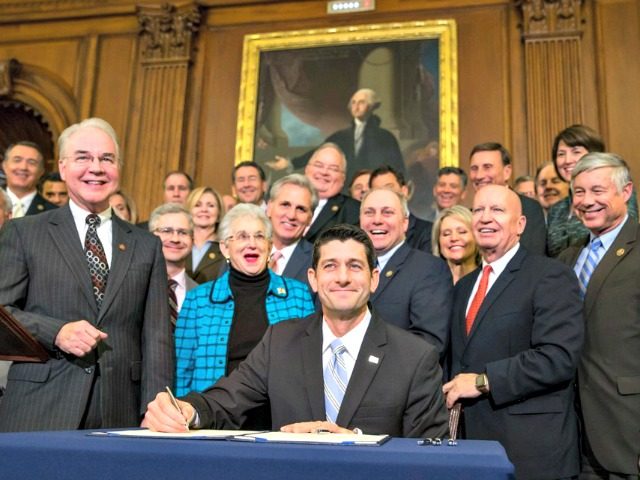Obamacare on the Ropes as House Follows Senate in
Post# of 52066


The House of Representatives voted Friday to approve Senate Concurrent Resolution 3, which sets in motion the repeal of President Barack Obama’s healthcare reform legislation, Obamacare, by a vote of 227-to-198, with nine Republicans voting against the repeal bill.
“This provided Congress with the legislative tools that we need to repeal and replace Obamacare,” said Speaker Paul D. Ryan (R.-Wis.), who spoke on the House floor before the vote. “This is the critical first step toward delivering relief to Americans who are struggling under this law.”
It is very rare for a speaker to take to the House floor and comment on a bill, so Ryan’s remarks signal the importance of the vote.
“The law is collapsing, the insurers are pulling out, and people can’t afford it,” he said.
“The deductibles are so high, it doesn’t even feel like you have insurance in the first place,” Ryan said. “This is a rescue mission. This is a necessary move and I urge all of my colleagues to do what is right.”
Nine Republicans voted with Democrats against the bill and no Democrats voted for the bill.
After Ryan was done, he shook hands with other Republicans and walked off the floor.
Although it is the custom for the speaker not to vote, Ryan did join the rest of his conference to support passage of the bill that does not truly repeal the 2010 Patient Protection and Affordable Care Act. Rather, because it is a bill using the track set up to pass the federal budget, it only addresses the financial underpinnings of Obamacare, such as the fees, taxes and, subsidies. Future legislation would have to address the rules and regulations.
Republican leaders chose the budget reconciliation process because Senate Republicans do not have the 60 votes required to end debate and proceed to a vote. A budget bill, however, has a fixed 50 hours of debate and then proceeds directly to a vote.
The incomplete repeal and the failure by Republicans to have a companion replacement bill that would cement the parts of Obama’s healthcare reforms that have consensus support—such as protections for people with pre-existing conditions or the ability to keep children on a parent’s plan until age 26—has raised concerns.
Following the speaker at the rostrum, the Minority Leader Rep. Nancy Pelosi (D.-Calif.) approached to be recognized.
“I’m so sorry that the speaker left the floor, because I have some very good news for him,” she said.
“Clearly, he does not understand what the Affordable Care Act has brought to our country in terms of expanding access to many more people and to the promise of our Founding Fathers of Life, Liberty and the Pursuit of Happiness,” she said.
The chairman of the House Freedom Caucus—the conservative bloc inside the House Republican Conference—Rep. Mark R. Meadows (R.-N.C.), voted for the partial repeal but has voiced his concerns about not having the replacement to Obamacare ready-to-go.
“This has been a top priority of mine and the Freedom Caucus, as I believe it is critical that we give the American people a clear direction and assurance of a smooth transition toward a sound, high quality, and affordable healthcare market—especially so the most vulnerable can get the coverage they need,” Meadows said.
“Going forward, I strongly believe and will continue to express that a full repeal of Obamacare should take effect within two years during the 115th Congress,” he said. “That is what we promised the voters we would do. That is our job–and it’s high time we accomplish it.”
Now that the bill has passed, House and Senate committees must come up with specific proposals for the transition to the post-Obamacare world. The committees are allowed to submit their proposals beginning Jan. 27 in order to be incorporated in a final “budget” bill.
The congressman Meadows whom succeeded as leader of the House Freedom Caucus, Rep. James D. Jordan (R.-Ohio), said he voted for the bill because he wanted to get the process going.
This is step one in the process to repeal Obamacare, a law that has driven up prices and hurt care. There are several steps to come but the goal is very clear: repeal it all – every regulation, every tax, every mandate – and do it this Congress,” Jordan said.
“All the talk of a three to four year phase out is not what we told the voters we would do. I will work to repeal it all as fast as we can,” he said.
 (0)
(0) (0)
(0)